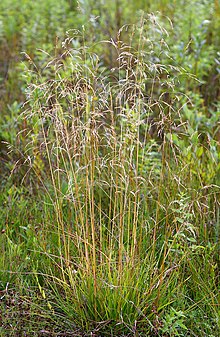Genus of flowering plants in the grass family Poaceae
Deschampsia genus of plants in the grass family Poaceae ,[ 4] hair grass [ 5] tussock grass . The genus is widespread across many countries.[ 6] [ 7]
The genus is named for French physician and naturalist Louis Auguste Deschamps (1765–1842).[ 6] [ 8]
Deschampsia species are used as food plants by the larvae of some species of Lepidoptera , including antler moth , the clay , clouded-bordered brindle , common wainscot , dark arches , dusky brocade , shoulder-striped wainscot , smoky wainscot and wall .
Deschampsia sometimes grow in boggy acidic formations, an example of which is the Portlethen Moss , Scotland.
Deschampsia antarctica the world's most southern monocot,[ 9] [ 10] flowering plants of Antarctica .[ 11] [ 12]
Some species, such as D. cespitosa , are grown as ornamental garden plants.
Species
As of November 2024[update] Plants of the World Online accepted the following species:[ 4]
Deschampsia airiformis (Steud.) Benth. & Hook.f. ex B.D.Jacks. – Chile , Argentina Deschampsia ampliflora (Tovar) Romasch., P.M.Peterson, Soreng & Barberá Deschampsia amurensis Prob. Deschampsia angusta Stapf & C.E.Hubb. – Zaire , Kenya , Uganda Deschampsia antarctica E.Desv. – Chile , Argentina , Antarctica , Falkland Islands , South Georgia , Crozet Islands , Heard-McDonald Islands , Kerguelen Islands , South Sandwich Islands Deschampsia argentea Lowe – Azores , Madeira , Canary Islands Deschampsia aurea (Munro ex Wedd.) Saarela Deschampsia baicalensis Tzvelev – Irkutsk Deschampsia barkalovii Prob. & Tzvelev Deschampsia berteroniana (Kunth) F.Meigen – Chile , Argentina Deschampsia bolanderi (Thurb.) Saarela , syn. Scribneria bolanderi Deschampsia boyacensis (Swallen & García-Barr.) Romasch., P.M.Peterson, Soreng & Barberá Deschampsia cespitosa (L.) P.Beauv. (including Deschampsia bottnica (Wahlenb.) Trin. ) – Kvarken Archipelago (part of Finland )Deschampsia chapmanii Petrie – New Zealand incl Antipodes , Macquarie Islands Deschampsia christophersenii C.E.Hubb. – Tristan da Cunha Deschampsia chrysantha (J.Presl) Saarela Deschampsia chrysostachya (É.Desv.) Romasch., P.M.Peterson, Soreng & Barberá Deschampsia cordillerarum Hauman – Chile , Argentina Deschampsia danthonioides (Trin.) Munro – Annual hairgrass – Alaska , Yukon , British Columbia , western USA, MexicoDeschampsia deminutospicatae Charit. Deschampsia domingensis Hitchc. & Ekman Deschampsia elongata (Hook.) Munro – Chile , Argentina , United States including Alaska , Canada, MexicoDeschampsia eminens (J.Presl) Saarela Deschampsia gallaecica (Cervi & Romo) Cires, Cuesta, Nava, García-Suárez, Fern.-Carv. & Fern.Priet Deschampsia gayana (Steud.) Romasch., P.M.Peterson, Soreng & Barberá Deschampsia gracillima Kirk New Zealand including Antipodes , Tasmania Deschampsia gulariantzii Prob. & Tzvelev Deschampsia hackelii (Lillo ex Stuck.) Saarela Deschampsia hultenii Prob., Tzvelev & Chiapella Deschampsia ircutica Tzvelev & Prob. Deschampsia kingii (Hook.f.) É.Desv. – Chile , Argentina Deschampsia klossii Ridl. – Lesser Sunda Islands , New Guinea Deschampsia koelerioides Regel – Siberia , Central Asia , China, Mongolia , Afghanistan , Pakistan Deschampsia komandorensis Prob. Deschampsia laguriensis Prob. & Tzvelev Deschampsia laxa Phil. – Chile , Argentina Deschampsia leskovii Tzvelev – northern European Russia Deschampsia liebmanniana (E.Fourn.) Hitchc. – MexicoDeschampsia looseriana Parodi – Chile Deschampsia magadanica Tzvelev & Prob. Deschampsia media (Gouan) Roem. & Schult. – central and southern Europe, Morocco , Caucasus Deschampsia mejlandii C.E.Hubb. – Tristan da Cunha Deschampsia mendocina Parodi – Argentina Deschampsia mildbraedii Pilg. – Cameroon Deschampsia nubigena Hillebr. – Hawaii Deschampsia ovata (J.Presl) Saarela Deschampsia parvula (Hook.f.) É.Desv. – Chile , Argentina , Falkland Islands , Anvers Island Deschampsia patula (Phil.) Skottsb. – Chile , Argentina Deschampsia podophora (Pilg.) Saarela Deschampsia pseudokoelerioides Prob. & Tzvelev Deschampsia pusilla Petrie – New Zealand South IslandDeschampsia robusta C.E.Hubb. – Tristan da Cunha Deschampsia sajanensis Prob. & Tzvelev Deschampsia santamartensis Sylvester & Soreng Deschampsia seledetzii Tzvelev & Prob. Deschampsia setacea (Huds.) Hack. – northern and western EuropeDeschampsia shiretokoensis Tzvelev & Prob. Deschampsia shumshuensis Prob. & Tzvelev Deschampsia sichotensis Prob., Tzvelev & Chiapella Deschampsia susumanica Prob. & Chiapella Deschampsia tenella Petrie – New ZealandDeschampsia teretifolia (Laegaard) Romasch., P.M.Peterson, Soreng & Barberá Deschampsia venustula Parodi – Chile , Argentina Deschampsia wacei C.E.Hubb. - Tristan da Cunha
Deschampsia formerly included many species now placed in other genera, such as Aira Antinoria Bromus Calamagrostis Centropodia Colpodium Dissanthelium Holcus Periballia Peyritschia Poa Trisetum Vahlodea [ 13]
References
^ "Genus: Deschampsia P. Beauv" . Germplasm Resources Information Network . United States Department of Agriculture. 1999-03-09. Archived from the original on 2011-07-21. Retrieved 2011-03-07 .^ lectotype designated by Nash in N. L. Britton et A. Brown, Ill. Fl. N.U.S. ed. 2. 1: 215. 7 Jun (1913)
^ Tropicos, Deschampsia P.Beauv. ^ a b c "Deschampsia P.Beauv." Plants of the World Online Royal Botanic Gardens, Kew . Retrieved 2024-11-28 .^ "Deschampsia " . Integrated Taxonomic Information System . Retrieved 2011-03-07 .^ a b Palisot de Beauvois, Ambroise Marie François Joseph. 1812. Essai d'une Nouvelle Agrostographie 91 descriptions in Latin, etymology explained in French^ Palisot de Beauvois, Ambroise Marie François Joseph. 1812. Essai d'une Nouvelle Agrostographie, plate XVIII (18) figure III (3) line drawing of Deschampsia cespitosa ^ Jstor Deschamps, Louis Auguste (1765-1842) ^
Young, Mark C., ed. (1955). Guinness Book of World Records 1997 Guinness Publishing Ltd. pp. 42 . ISBN 0-9652383-0-X
^
Wali, Mohan K.; Evrendilek, Fatih; Fennessy, M. Siobhan (July 2009). The Environment: Science, Issues, and Solutions ISBN 978-1-4200-0733-6 . Retrieved 25 Sep 2016 .
^ Smith, Ronald I.L.. 1984 Terrestrial plant biology of the sub-Antarctic and Antarctic. In: Laws, R.M., (ed.) Antarctic Ecology, vol. 1. London, Academic Press, 61-162.
^ Holderegger, Rolf; Stehlik, Ivana; Lewis Smith, Ronald I.; Abbott, Richard J. (May 2003). "Populations of Antarctic Hairgrass (Deschampsia antarctica) Show Low Genetic Diversity" . Arctic, Antarctic, and Alpine Research . 35 (2): 214–217. doi :10.1657/1523-0430(2003)035[0214:POAHDA]2.0.CO;2 . ^ "World Checklist of Selected Plant Families" .
